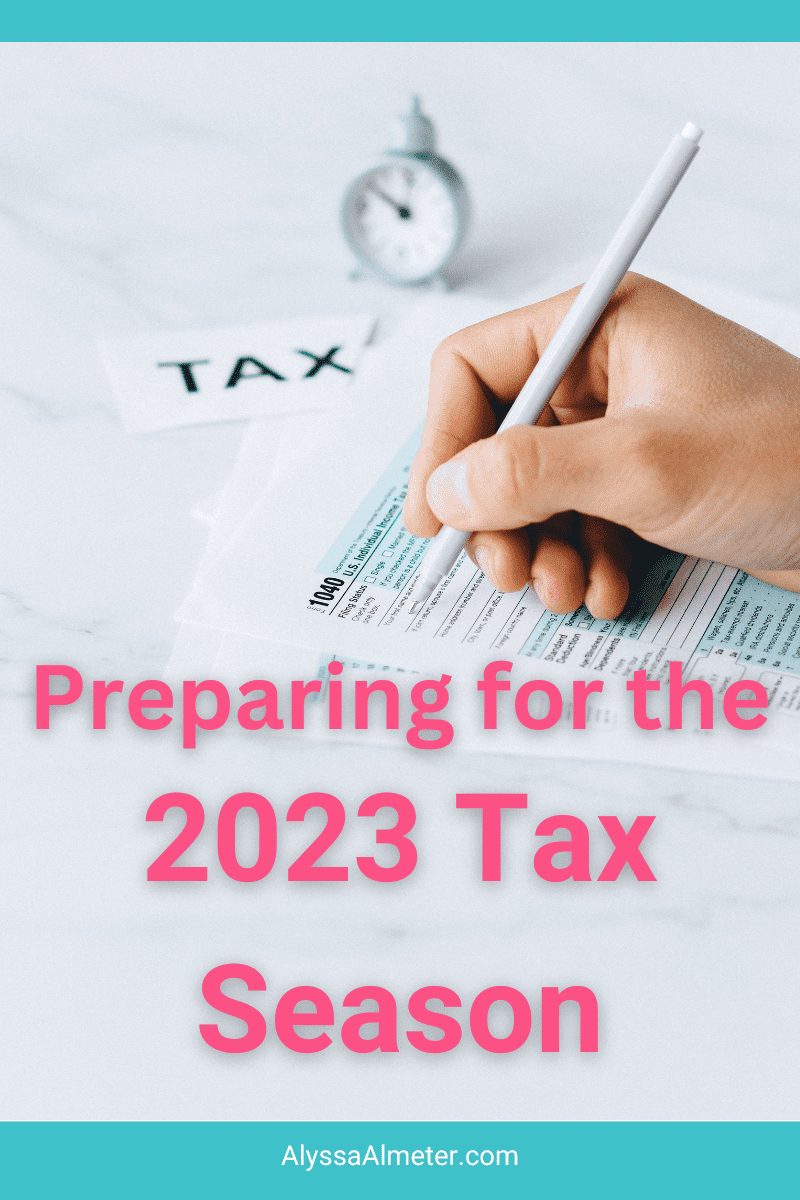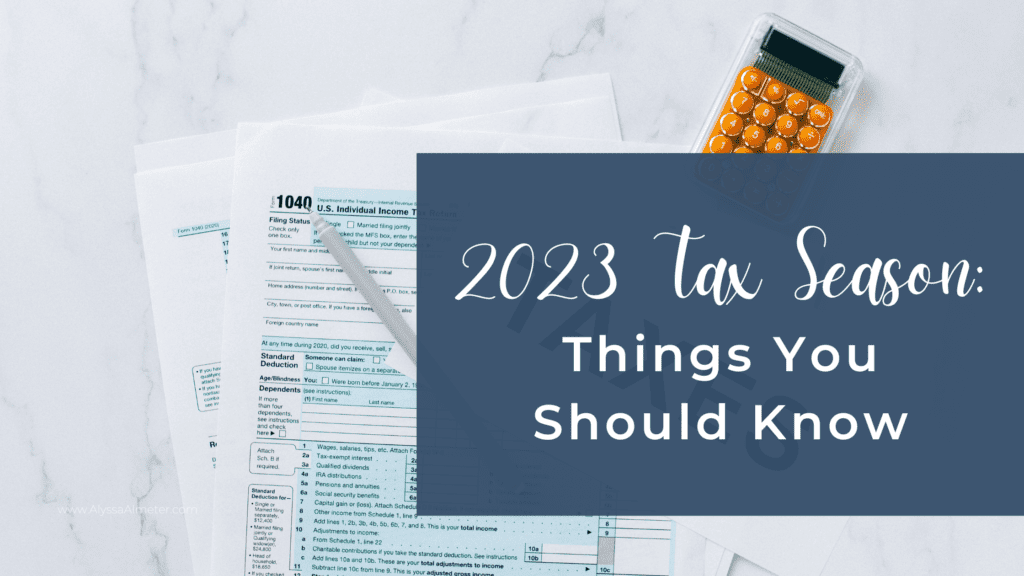Are you an early bird or procrastinator when it comes to filing taxes? Whichever one you are, you will need to know these dates and important information to help you prepare for the 2023 tax season.
Disclaimer: I am not a tax professional. This post is a guide based on my own research to help you prepare for your taxes. For help on your specific situation, contact an accountant in your area.
Important Federal 2023 Tax Season Dates
The 2023 tax season starts in January 2023 and goes to April 2023. This is the timeframe for filing your taxes for the 2022 tax year. Here is a list of important dates you should know.
January 23, 2023
- IRS will begin accepting tax returns from the 2022 tax year.
January 31, 2023
- Employers must have W-2 forms completed and sent. This doesn’t necessarily mean you will have your W-2’s in hand. They need to be sent by this dates. Know if your employer will send these electronically or physically. If you don’t receive them shortly after January 31st, contact your employer.
- 1099 forms completed and sent. More details on what type of 1099 forms and who should receive them below.
April 18, 2023
- Tax Day – taxes filed and paid without extension. Typically Tax Day is April 15th but the 15th is on a weekend this year.
- Last day to file for an extension.
- Last day to contribute to HSA and IRA for the 2022 tax year. Individual filers can still contribute to their HSA and IRA for 2022. These have yearly contribution caps on them so this is a great opportunity to max out your yearly contributions. The 2022 HSA limit is $3,650 for individuals and $7,300 for families. The max contribution to IRA is $6,000 (or $7,000 if you are over 50).
October 16, 2023
- Deadline for submitting taxes if you filed for an extension.
Sign up with TurboTax and save 20% off your federal return fee by using my referral code.
Expect a Smaller Refund for the 2023 Tax Season
According to the IRS, your refund may be smaller than last year compared to last year because there wasn’t any stimulus payments.
Information You Will Need
When filing your taxes there is some personal information you will need for yourself and family members.
- Name and spouse’s name
- Social Security Number
- Spouse’s Social Security Number
- Names of dependents
- Social Security Numbers of dependents
- Driver’s License ID number for you and spouse

Documents You Might Need
Keeping your financial documents organized throughout the year will save you lots of headaches when it comes time to file your taxes. Whether you are doing your own taxes or using an accountant, you will need various documents.
Here is a list of some documents you might need. This is not a full list. If you think you are missing a document it is best to contact an accountant to see what you need for your specific situation.
- W-2 form from employer
- 1099-NEC if you received at least $600 in commissions as an individual contractor. This may include any freelance work or money earned from a direct sales company.
- Distributions from HSA (Form 1099-SA)
- Interest statements from savings or checking accounts (Form 1099-INT)
- Mortgage Interest Statement (Form 1098)
- Charitable contribution statements
- Unemployment income (Form 1099-G)
- Retirement income from pensions, annuities, IRA’s, insurance contracts (1099-R)
- Prizes and awards
- Trust or beneficiary income (Form 1041 or Schedule K-1)
- Rental property income (1099-MISC)
- Student Loan Interest paid (Form 1098-E)
- Income from selling stocks or bonds (Form 1099-B)
- Sale of property or home (Form 1099-S)
Related: How to Organize Financial Documents
Federal Income Tax Bracket Changes
It’s on everyone’s mind…inflation. To help with the higher prices of goods, the IRS adjusts the tax brackets. This means you may fall into a different tax bracket, which isn’t necessarily bad.
To better understand how inflation effects your tax bracket and which tax bracket you will be in, check out these 2 articles by Kiplinger:
How Inflation Can Impact Your Taxes
What are the Income Tax Brackets for 2022 vs. 2023?
Student Loan Forgiveness Tax
Under the CARES Act, borrowers that received student loan forgiveness in 2022 will not be taxed at the federal level but some may be taxed at the state level (depending on the state).
According to this Kiplinger article from November 2022, some states consider loan forgiveness as taxable income. Arkansas, California, Indiana, Minnesota, Mississippi, North Carolina and Wisconsin are among those states. If you live in these states and received at least $600 in student loan forgiveness, make sure you received Form 1099-C from your lender.
Standard Deduction Increase
For the 2022 tax year, the standard deduction increased to the following:
- Single and married filing separately – $12,950
- Married filing jointly – $25,900
- Head of Household – $19,400
Child Tax Credit
Parents, this one is for you! For each child in the house that is under the age of 17, you will receive a $2,000 child tax credit per qualifying kid. The income limit to qualify is $400,000 for married couples and $200,000 for singles.
Earned Income Tax Credit
The Earned Income Tax Credit (EITC) is designed for low to moderate income households to have a tax break. The credit reduced the amount of taxes owed. To qualify for the 2022 tax year, you must be a US citizen with a valid social security number that earned less than $59,187 for the year.
There are several other factors you must meet to qualify. It is best to check the IRS website for all the qualifications.
Speed Up Your Tax Return
Making sure you have all the necessary documents when you file your taxes will help you speed up the process. So if you’re expecting a return (and not having to pay), that means you get your money back sooner!
The IRS suggests that filing electronically and submitting your direct deposit information will help speed up the process on their end (also helping you get your money sooner). The earlier the better so you don’t get hung up in their backlog. This goes for anyone that is filing themselves or using an accountant.
We love using TurboTax. We have been using it for years and it’s so easy! They walk you though each step, asking questions to help identify what forms and information you need. If you want to file your taxes yourself and save some money by doing so, sign up with my TurboTax referral link. You will save 20% on your federal filing fee and I will receive a $25 gift card. Win Win!


